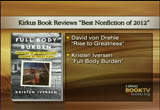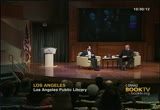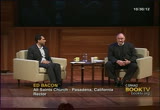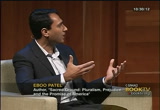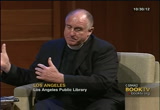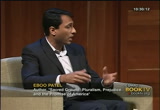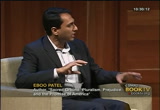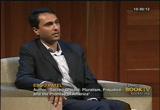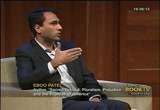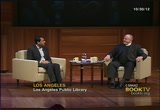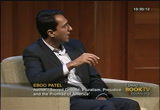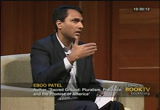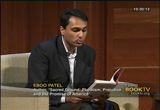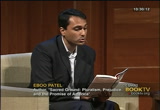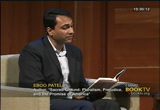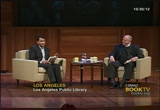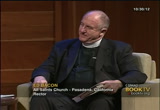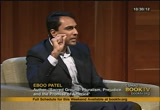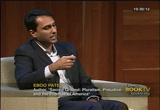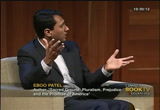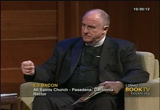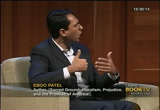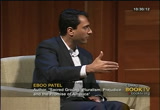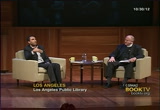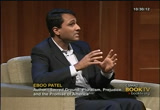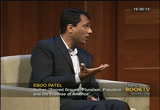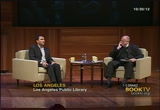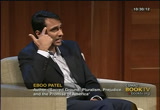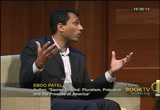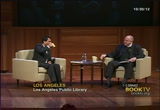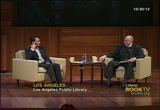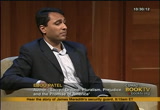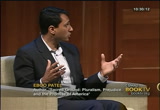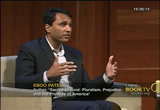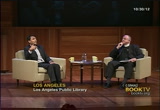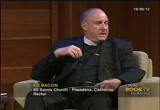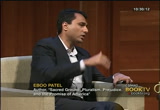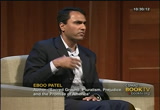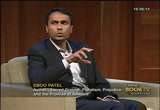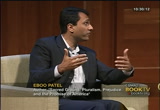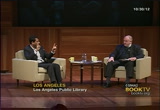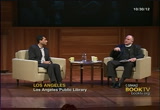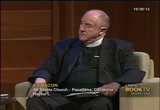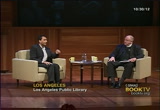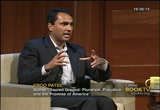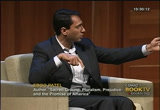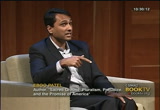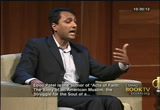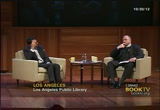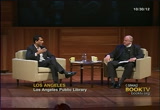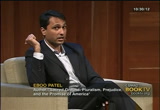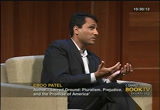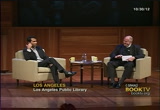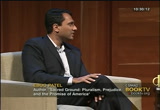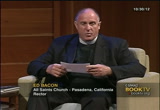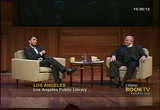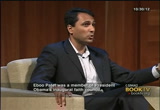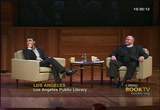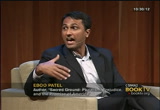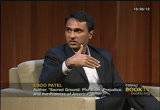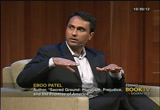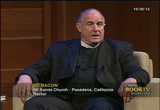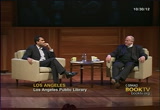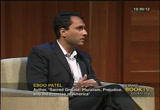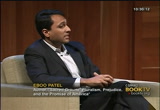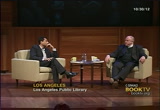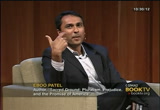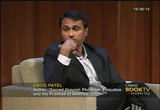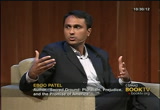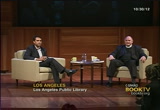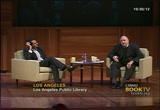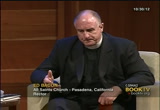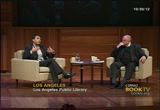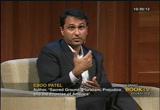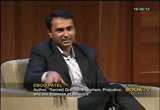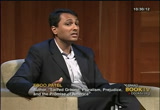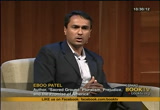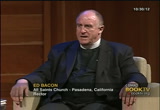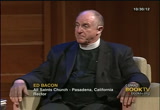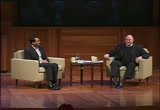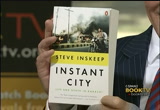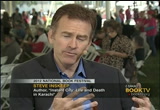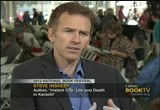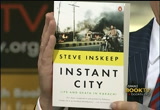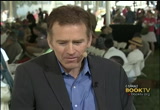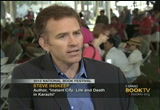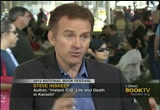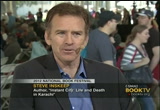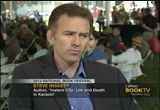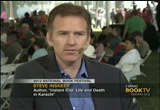tv Book TV CSPAN December 23, 2012 7:45am-9:15am EST
7:45 am
>> this at booktv's website for our facebook page, facebook.com/at booktv. >> and now, eboo patel, a member of president obama's inaugural faith council, argues that america should strive to be a pluralistic country where religion is a bridge to cooperation rather than a fissure between people. this is about an hour 20. >> good evening, everyone and thanks for being here. i am very excited to be with my u.s. best friend, eboo patel. i've had a wonderful time reading this book, and am very
7:46 am
excited about having this conversation with him and then drawing you into that conversation. one of the delights about his book is his disclosing something of his own spiritual practice, particularly during the holy season of ramadan. he had many when he said that prior to entering the day he would get up, have a small breakfast, and then have a time with -- [inaudible] one of my favorite poets. and i thought it was really wonderful if we all could have kind of a moment of censuring around eboo reading one of his favorite poems. how does that sound? >> all right. thank you for the invitation to thank you all for being here. so, this is a poem that actually first heard where rumi is buried in turkey.
7:47 am
come, come whoever you are. wanderer, worshiper, lover of reading but it doesn't matter. house is not a caravan of despair. no, even if you broken your vows, a thousand times. come yet again, come, come. a couple reasons that this is meaningful to me, it's actually in the book trying to an say whenever look at the statue of liberty, this great, this beautiful woman of welcoming, the inscription is bring me your tired, your poor, your huddled masses, yearning to breathe free. it's this notion of america. a radical welcome openness, bring a tradition, plant the seeds and americans will. let them grow into institutions and into the obligations of welcoming and open to others. so that spirit of welcoming and openness that i think is at the heart of american tradition that i think it's at the heart of islam as well.
7:48 am
no one articulates that better or well then rumi. >> so, i need to confess that i get emotional when a talk to people like eboo about the issues that we're going to be addressing tonight. particularly the issue of interfaith relations, and also the issue of the idea of america. right after 9/11, several of us, a lot of us gathered at a mosque here here at usc, and i heard a sentence that changed my life. and it was this, to be religious in the 21st century is to be interreligious. and it is that dedication that draws me to eboo and the way he thinks. so, i'm going to apologize only once for an emotional about this man. if i get choked up your just
7:49 am
say, chalk it up to that. but one of the great moments in this book is his telling about a genesis moment. so, eboo, would you? >> this is actually from and on 2010. it's august of that years from waking up at around 4 a.m. and i'm having my last meal before my prayers that begin the time of fasting. it's at that point that i'd like to, as muslims do, to read more from the garage or from rumi, or just additional time of censuring and meditation to god listens extra closely during those dawn ours. but instead, if people remember what was happening in august 2010, it was the crazy discourse were having around the ground zero mosque. and so i'm not reading rumi. i'm not reading the koran but i'm literally right wing hate hate websites trying to anticipate the storyline of the day because everyday there are new attacks on the founders of
7:50 am
cordoba house. there's a new word about this being a terrorist command center et cetera, et cetera. these are people i've known for many years, people whom i've admired who have spoken of building an institution supported by the muslim community that would be of service to the entire nation. and cordoba house was the fruit of their vision. so i'm basically trying to figure out if i get called by cnn or whoever else can what am i going to say. that's when i see my name. eboo patel, muslim extremist. eboo patel, muslim radical. eboo patel, muslim terrorist and i'm like, are you kidding me? really, me? you know. and it was, at the time i felt like i was teetering between anger and despair. i thought that america had introduced twilight zone happily, that our nation wanted
7:51 am
to believe the uglies, hateful, and twisted lies about a religion that is 1400 years old and it has one and a half -- around the world. it was not a particularly happy or spiritually enhanced ramadan. so a couple days into i think the second week of ramadan i got a phone call from a spiritual mentor in my life, you know, maybe the most well-known muslim preacher in america, especially within muslim circles. he kind of place a st. francis of assisi wrote him a lot and he also plays sort of the mad scientist back to the future movies. kind of jump in my life and he will come to you don't have to read poker go to a conference and 50 will disappear. fully calls and he says -- how are you doing? and i'm like, i'm really terrible. you know, i can believe what's happened. i can't believe they are
7:52 am
circling what is effectively a muslim ymca a terrorist command project. and he is not one to hold his fire, says something that turns by world around. he says, you're getting this all wrong. these are the moments -- these are not the moments to be angry or just a big these are the moments that change. our nation is molten and can be shaped. and unlike what are you talking about? and he said, listen, we have known that there is a, and ignorance around islam in america. would also know that there are these really ugly forces of prejudice who want to repeat the lies of hatred of the al qaeda of the world. now it is out in the open. and what happens when an ugly prejudice is out in the open is that better angels of american nature will. engage those and defeat them. and you, especially the work you at interfaith, you have to do your work at this point.
7:53 am
and then click and he was gone. that's the mad scientist from the back to the future movies part. that's when i started thinking, yeah, that we actually have this real beautiful dynamic across american history where the force of prejudice, whether it's the 1650s or the anti-catholic and anti-jewish forces through much of the 18, 19 than early 20th century will try to marginalize the community. and other people who i call the -- will stand up and defeat them. and this was our chance to write our version of that chapter of american history. and it was actually a great honor to be able to be part of that. that was the beginning of the book. >> so we just kind of read that again, right? that leads you to an exploration
7:54 am
of what i think is a really radical moment, and a correct understanding of the essence of america, the ideal america, which interestingly enough resonates with something the prophet mohammed says. >> right. so there's this beautiful line that muslims follow that safety peace and blessings be upon him. none of you toward a belief until he wants for his brother, or his fellow what he wants for himself. in my mind i connect that with one of the same of -- the first of the shiite imams who sends a letter to his governor in egypt and says everybody there is either your brother in faith or your equal in creation. and this notion is central i think of both islam and america, right, that we have to lift up
7:55 am
and emphasize the dimension of our traditions that build relationships with people different from us but it's this notion that suddenly radical openness but faith and nation as a breach of cooperation rather than a barrier of division. there are powerful movements out there making especially faith. a big part of what you about in your church, the part of what we are about, where big part of what reverend innovation and folks are here from impact, i have a lot of friends in this room, a big part of what they are about, or what they're doing is making a bridge of cooperation but i would like to read a selection from "sacred ground," that america is a nation that this is woven into our dna, and i view it as the chief of not just of the american promise, but also something really beautiful from the holy quran where god says i made you different nations of drives so you may come to know
7:56 am
one another. with a chance to achieve that in america and the kind of right that in the final passage of the introduction of sacred ground which villages read to you. ipo by many people in this book, but the main character is the one i love the most. america. you as you might we can for her in every turn. she is the nation i belong to, believe in, seek to build up. she's the ultimate competent character. a character with a complex and inspiring past. a character of its future will be determined by the many characters who call her home. the strangest part of ecuador but house debate to me was the idea of sacred ground. the people opposed to cordoba house insisted the blocks around ground zero constitute a holding area. those who believe cordoba house august the in lower manhattan act appointed nearby strip joint and off-track betting parlor at, this patch of land is just like any other. why can't you just know 10 or 20 blocks away a cnn anchor asked
7:57 am
me on air at the height of the controversy? that would still be sacred ground. 100 miles north, a thousand miles south, 2000 miles west. it's all holy. i believe every inch of america is sacred from sea to shining sea. i believe we make it wholly by who we welcome and the how we relate to each other. call it my muslim eyes on the american project. we made you different nations and tribes that you may come to know which other says the chronic there's no better place on earth in america to enact that vision. it is part of the definition of our nation. i say democracy is only of use their that if they pass on an come to its fruit and manners in the highest forms of interaction between men and their beliefs and religion, literature, schools same witness. moralism is not a birthright of america. it's a responsibility. pluralism does not fall from the sky. it does not rise up from the
7:58 am
ground. people have fought for pluralism. people have kept the promise. america is exceptional not because there's magic in our soil, but because there's fierce determination in our citizens. the greatness of america lies not in being more i'm liking any other nation but rather in her ability to repair her false. every generation has to affirm and extend the american promise. when i think of that promise, i think of the christmas pageant at the catholic school and the north side of chicago where my firstborn started his education. the school is an american rainbow, african, polish, mexican, croatian, indian, you name it it's there. they're all gathered at the christmas pageant, the three-year-olds are standing on the rickety stage gleefully parading about in the santa hats. my son is talking to his friend lisa, the chinese girl with a white mom and the pakistani and. i am cooing in the air of our
7:59 am
newborn baby when the signal comes and the class starts in on their assigned some. it's a little wobbly at first but they catch the swing soon enough, and when they hit the chorus i can't help myself. i start to sing along. i love this melody. i love the sight of my sweet kid among all these other sweet kids. i'm remembering the sheer all i felt him at first sight in a redwood forest, the adrenaline pumping through my veins when inhaled my first taxi on the new york island. my sons will make their own memories on this blessed patch of earth. one day, they will realize just what it means that this land is their land, and that they share with 310 million others. when my son was a baby and woke up crying in the middle of the night, i would walk up and down her hallway singing this song. it was a long time since i last sing it, maybe fifth grade, but the words came back easy, like they were written in me. they are at the christmas pageant with my kids and my countrymen, i am bursting with
8:00 am
8:01 am
around muslims. and this was a really ugly time. there were shots fired, shots allegedly fired outside of a mosque in buffalo, a muslim cab driver was asked if he was muslim and was stabbed four times in response. there were mosques being opposed from literally san diego to staten island, from sea to shining sea, so it wasn't just this one project. it was, you know, my mom called me, and she said your kids are young, there's till time to change their -- there's still time to change their names. i'm like, what are you talking about? she's like, just think how they're going to be treated with muslim names. i was like, mom, zeta and khalil are american names. think of all the people standing up for muslims. and it was true, right? i want to tell just one brief story that i tell in the book, and i get choked up even thinking about this. so there was this young intern
8:02 am
at interfaith youth corps u college student at nearby depaul university, and the task we'd given him was to compile, basically, all the most relevant media about anti-muslim stuff happening during the cordoba house madness, and he would hand me a file at the end of every day with, you know, these stories all categorized so i could prepare for whatever media we might have the next day. and it's at this time -- this is now becoming the fall of 2010 -- that there are a couple of really ugly incidents around lgbt folks in the united states. there's the terrible suicide at rutgers, there's the terrible beat anything the bronx of a couple young gay men, and somebody hands me out of the blue at my office a blog post that this young man wrote with, nick lang. my interact was basically --
8:03 am
interaction was basically him imagining his own suicide. and it turns out nick's gay. and i said to him, you know, i am stunned that at a time when folks who share your identity are going through violent prejudice, you are spending your time interning for free at an interfaith organization compiling news stories about prejudice jens muslims. and -- against muslims. he looked at me, and he says i'm committed to an america that's free for everyone. and if i want my people to be free in america, i have to build an america where everybody feels welcome, including your community. i thought that was so beautiful and so mature. and i thought to myself, you know what? that's the most american thing that you can do, is to stand up for people who are different than you.
8:04 am
and i want muslims to stand up for him. >> wonderful. um, i would love to stay there, there are two or three other stairs i'd like for you -- stories i'd like for you to tell, but i see the clock, and we're going of to have to move on because, um, i want you to say a few things about your organization. and, um, after that then i have another question just to kind of refine that. um, i have a muslim teacher here in los angeles, and he loves to talk about the passage from the quran that you mentioned that we have been given diversity as a gift so that we can learn from one another, is that correct? >> we can come to know one another. >> come to know one another. and he said that is not about tolerance. >> right. >> it is about coming to know one another.
8:05 am
could you take that as a kind of a launching pad for talking about -- >> yeah. thank you for that. >> -- talking about what you do with your organization. >> sure. so what interfaith youth corps does, this organization that i'm founder and president of and what this book we hope is going to help expand the field of interfaith cooperation of which we're one organization, and in some ways it tells the story of who we've been in the last couple of years at interfaith youth corps and who we hope to be. we think that interfaith cooperation ought to be a southerly norm in the same way that volunteerism, human rights, environmentalism, multiculturalism have all become social norms and that a particular sector which is college campuses ought to play a front and center role in that. there's a number of reasons for that. one is, you know, campuses, obviously, advance a knowledge base for our society. and i think that, you know, when i was in college and my friend from grad school, my closest
8:06 am
friend from grad school, matt fisher, and we would talk about this a lot when we were at oxford together was going through the multiculturalism movement on college campuses in the mid 1990s and how that had reframed our view of america as a nation where people from multiple commitments had made distributions and helped advance the project. and the one w0rd we heard very little about during that movement was religion, right? so there was a lot about multicultural literacy, multicultural leadership, multicultural relationships, but very little about interfaith literacy, interfaith relationships. and we think at interfaith youth corps that college campuses ought to model that for the country. they ought to advance that knowledge base of interfaith literacy. they ought to be places where young people build positive relationships with each other, where you have got a critical mass of interfaith leaders coming up that are, first of
8:07 am
all, trained on those college campuses and then move into the rest of society when it's at hospitals or law firms or in seminaries and bring that interfaith literacy and interfaith leadership to the rest of our society. we define interfaith cooperation very simply. it's building relationships between people who orient around religion differently, and some sector has to advance the knowledge base, has to model what good looks like. and college campuses are the place that we think we can make the biggest difference. >> so talk a little bit about this triangle. >> yeah. >> i think it's important for all of us to have this in our mind. >> so this is a chapter in the book called the science of interfaith cooperation. and one of the things that i think is -- as interfaith cooperation grows and, by the way, if i was in the private sector, i would say buy interfaith, right? [laughter] it's, i think, like human rights or like environmentalism, it's a field that's going to grow dramatically. if you read any newspaper,
8:08 am
you're going to see a lot of blood between the black and the white, right? and there's an unfortunate or amount of that blood that is done to the soundtrack of prayer. just to give you one example of this, one of the -- the question that people are focusing on when it comes to the transitions of muslim countries towards democracy and market economies are generally about governance and about economics. but frankly, there's a third key question as well, and that is can the christians and the muslims of egypt, can thal weets and -- alawites and shias, can they build societies together? can the kurds and the sunnis and shias of iraq, right? this is a question of how different sects and religious communities relate to each other is going to be one of the central questions of the 21st century. that's one of the reasons we need a really robust field of
8:09 am
interfaith cooperation helping to make faith a bridge of cooperation rather than a barrier of division or a bomb of destruction. so anything that deserves a field deserves to have the question how do we do this well answered. and you can see this as a robust discourse within the field of education reform or within the field of poverty alleviation or within the field of environmentalism, right? it's not just about doing it, it's about doing it well. it's a part of what we've done at interfaith youth corps is look through the research over the last ten years at harvard, princeton, pew and gallup and all the social science research and ask the question of effectiveness. what does this teach us about how to do interfaith cooperation well. and what you come up with is, actually, a very simple model. we call it the interfaith triangle. we know based on social science research that if you know one person of a different religious background f you have a single meaningful relationship with,
8:10 am
say, a mormon or a evangelical or a muslim or a jew, our attitudes towards that whole community improve. we also know your attitudes towards other religious communities improve, right? we also know that if you have what we call appreciative knowledge of a different religion, something as simple as being able to place the quran or the prophet muhammad within islam, that your attitudes toward that tradition improve. attitude, knowledge, relationships are deeply connected. so what's an effective interfaith program, right? by the way, this might sound simple and common sense, and as somebody with a ph.d. in the social sciences i'm very happy to say that part of what we do is derive the data that proves common sense, and in this case it's definitely true -- [laughter] you wouldn't believe how many interfaith programs i've been to where people will choose the most divisive topic imaginable,
8:11 am
the middle east or abortion, and they'll take people on opposite ends of the pole, put 'em on stage and basically say, fight. [laughter] right? and the audience leaves mad at each other, and people wonder why. you're not facilitating positive, meaningful relationships within people. you're not advancing appreciative knowledge, right? just because you have people from different religions in a room talking about religion doesn't mean it's interfaith. in fact, given the way religious discourse goes in our society, it's a lot easier to default to arguments about divisiveness than it is to advance appreciative knowledge and meaningful relationships. so an effective interfaith program is one where somebody walks up and says, you know what? i had a conversation, i didn't know much about that community, frankly, i had negative views, but after meeting matt from that tradition, i'm going to hook at that community differently. or i learned about this beautiful line from rabbi hi
8:12 am
hell in judaism. if i am only for myself, who am i? if not now, when? right? that's appreciate ty knowledge about that tradition. that's inspiring. so a big part of what we're trying to do at interfaith youth corps is train a critical mass of interfaith leaders on college campuses who will first start those programs on their campuses, right? campuses are these really inspiring microcivil societies in our culture where you can take a religious studies 330 class and read ed bacon or robert putnam and say, wow, that is an interesting way, walk across the quad and start a better together campaign. and you can literally have a program going in a week. one of the things i tell college students that i talk to now is the single most disorienting thing for me when i graduated from college was, you know, where are all the people running around whispering in my ear how
8:13 am
great my idea is. because there are people on taffe at college, reverend danny fisher, is paid to tell these e students how good their idea are. so take advantage of that. build that knowledge of interfaith leadership. learn those skills. practice running those programs. and then when you become a doctor, you go into politics, you come to hollywood, it's a lot easier to facilitate relationships between people of different religions because you've flexed those muscles as a 19 and 20-year-old college student. so we're looking to build that movement at interfaith youth corps. >> but you've had interfaith youth corps for almost ten years. and i really -- i want to punctuate this for a moment because i think it's important for those of us who appreciate the value of interfaith work into religious knowledge and relationships.
8:14 am
the -- to hear the story of your going to have a steak with a good grilled steak with your friend -- [laughter] >> right. >> -- who really caught you up short. and from my reading, changed -- >> yeah. >> -- what you're doing a little bit. >> yeah. so this was not a happy afternoon. this was fourth of july weekend a couple of years ago, and one of our board members at interfaith youth corps is director at mcends si and company. and he had said to me, you know, let's do a pro bono assessment of how this organization has been doing over the first eight years of its existence, and i was like, you know with, great. spend your mcends si money and tell us how great we're doing, right? and i didn't know that's not how consulting generally works. so my wife had promised as we're
8:15 am
heading up to ta reck's house july 4th weekend, she's like no shoptalk. and i'm like, you know, who's talking shop? we're just going to have a great time looking out over the lake and enjoying steaks. so he looks at me, and he's like so i'm getting some of the data back from our assessment of interfaith youth corps, and i was like, yeah? and he's like, yeah. it's not going so great. and i'm like, come again? it's not going so great. i'm like, what are you talking about? i also didn't know how concrete consultants can get. he's like, well, when you go speak at a college campus, people really like it, but three months, six months, nine months, twelve months later, they're not really taking action. and i'm like, you know, this does not sound great. and then he kind of dug the knife in. he says, and actually i have a theory about this. and i'm like, what's your theory? he's like, my theory is your
8:16 am
fault. [laughter] i kind of wish i hadn't asked that question. and he's like the problem, eboo, is when you talk about interfaith cooperation, you talk about 100 different things. and the truth is people can't and won't do 100 different things. you have to be able to articulate an aspirational vision of this in a way that people take action and not measure your effectiveness by the applause after speeches. the effectiveness of interfaith cooperation is how many people are becoming interfaith leaders, starting their own interfaith programs on college campuses and going on to vocations of interfaith leadership. not necessarily professional vocations, but as it's part of their identity just like being a human rights activist or an environmentalist or somebody who believes in multicultural cooperation regardless of your profession, right? and being an interfaith leader ought to be part of your identity whether you're a lawyer, a banker or a hollywood agent. that wasn't happening in the older version of interfaith youth corps.
8:17 am
and so we went through, i went through a period of kind of dramatic identity change as somebody who was as i was sharing this with you earlier, my question used to be, you know, what's your cool, new idea. my question now is what are you building that's going to last, right? and we want to build an institution at interfaith youth corps that's going to last, and we want to be part of a movement that writes the next chapter in the glorious story of american pluralism. and in order to do that, you have to pay some attention to effectiveness. and a big part of being effective is articulating clear visions that people can take action on. so we took our eight different interfaith leadership models and collapsed them into a single model. we run three to four interfaith leadership institutes every year on college campuses across the country, in fact, we're just closing one right now at the university of southern california where several dozen students are being trained to
8:18 am
build relationships between people of different faith backgrounds including humanists, and they go back to their college campuses and start something called a better together campaign. and we have a staff of people at ifyc who supports their cam campaigns. so we've gone from an organization that did 12 or 15 different things, and, frankly, if you're a 35-person organization doing 12 things, there's a reasonably good chance you're not doing anything well to an organization that basically does three things. all of them against the hyperclear goal of making interfaith cooperation a social norm through the sector of higher education. and that was a transformation for me because i used to kind of rate my intelligence by how many times i could connect the most recent new yorker to the atlantic monthly to an ancient, you know, sanskrit tradition to contemporary america. and, you know, it sounded great from a stage, and people would leave, and they'd be like what
8:19 am
did that dude talk about again? what am i supposed to do? [laughter] now we want to say we want you to be an interfaith leader. we want you to start programs on your campuses and in your communities that effectively work the interfaith triangle. >> yes. the interfaith triangle. so, you know, i've been doing interfaith work for a long time, and i agree with you that neither the combat on stage is going to be interfaith cooperation and is not going to make up a norm, nor is sitting around having tea and cucumber sandwiches with some jews and muslims, etc. [laughter] there has to be something where there's traction. now, looking at this group, a good many of us, um, have already been in college. [laughter] and yet we're here to learn from you. so what about us? what about our lives?
8:20 am
what about what we can do to transform america to have this new norm? >> right. so i think it's important for everybody to be an interfaith leader. an organization has to focus somewhere, and we've chosen college campuses for a variety of reasons, but i think everybody ought to be an interfaith leader. i'll talk about two parts of this, right? one is having what i call an appreciative knowledge of other traditions, and i tell a lot of stories about in "sacred ground." your practice of fasting ramadan with other muslims, your knowledge of rumi, your understanding of how other people's prayer practices connects them with the define and the ability to find resonances between your tradition and that and other people's tradition. there's -- folks remember the ground zero mosque madness from a couple years back. there was a guy who held a sign famously at an anti-muslim rally that said all i need to know
8:21 am
about islam i learned on 9/11. and i looked at him, and i thought, you know, at least you're telling the truth, right? and honestly, what much of what people know about a tradition that's one and a half billion people around the world and 1400 years old is the heinous, ugly terror of 9/11 and a handful of other violent incidents afterwards. and it's not that those things didn't happen or that they're not important. they're terrible, they happened. they're, you know, muslims around the world have and ought to have repudiated them. but they don't represent a tradition. and if we don't know that the most, the deepest value in islam, for example, is mercy and devout muslims say dozens of times a day in the name of god, the all merciful, the ever merciful, right? and the first lesson of classical muslim scholarship to
8:22 am
their students was if you treat people on earth with mercy, the one if heaven will be merciful to you. that's appreciative knowledge about a tradition. it's the kind of thing that everybody, i think, ought to have, especially at a time when the forces of religious prejudice are loud and want to tell you that what the al-qaeda types are saying about islam is true. if we don't have other knowledge than what we hear on the evening news about a religion or, frankly, religion period these days, then the folks on the evening news win. the second thing that i want to bring up is what i call in "sacred ground "a theology of interfaith cooperation. one of the things i've learned in, you know, 12 or saw years of working in interfaith cooperation and getting a ph.d. in the sociology of religion is that the people who want to make faith a barrier to religion or a bomb of destruction, the religious extremists or folks who want to create divides, they're really good with chapter and verse.
8:23 am
they can quote you tip of the tongue where in the bible it says i can't like you or where in the can quran it says i have to say separate from you. and if the response of those of us in faith communities is, uh -- they win. so theologies of religious extremism and theologies of religious divisiveness are highly salient and actually very loud in our world today. and, frankly, it's easy to take a couple of pieces of scripture here and a couple moments of history there and a figure here and an item there and string them together and say that's christianity. the fact is you can do that just as easily -- and, frankly, i believe more justifiably -- in a scholarly sense around interfaith cooperation. and a good part of "sacred ground" is devoted to those stories, right? so part of what i do is as a muslim, i do a good
8:24 am
interpretation of the good samaritan story, and, of course, it's this kind of -- it's maybe the archetypal christian story of somebody leavitt -- left for dead by the side of the road connecting jerusalem and jericho, and a priest passes them by. two people from his own faith community leave him. the person who with stops nurses him to health, brings him to an inn, tells the innkeeper, gives the innkeeper two days' wages and says if this person needs to stay here longer, i will come back and pay s a samaritan. who's the samaritan? the samaritan is not just the marginalized person which is how the story's generally told or the other, the generalized other. the otherness of the samaritan is religious in nature. the samaritan is somebody from a different religion. right? and the story begins by the lawyer asking jesus how do i
8:25 am
attain eternal life. so this is a story that's meant for the cosmic. there's a connection to the heavenning here. and jesus ended the story by saying go and do likewise. so there's this beautiful movement at the effort of the christian scriptures where the founders of our faith traditions are saying follow the ethic of the person who prays differently and who, frankly, has beliefs we disagree with. but in this case is modeling the ethic better than we could ourselves. >> yeah. the fault line that you just referred to is a very powerful moment for me in your book. early in my life in the interfaith community in los angeles there were a group of us, jews, muslims and christians, working together about nuclear armaments.
8:26 am
we had a particularly important moment, and the senior rabbi in our group said i'm just noticing how i feel much more kinship with the people in this room than i do with some of my co-religionists. all of us began to nod our heads, because i as a christian, you as a muslim, he as a jew have all experienced the phenomenon of co-religionists hijacking our religion. >> uh-huh. >> when you speak about those terrorists who hijacked islam on 9/11. um, that -- jesus has me call him my brother. florida preacher who wants to
8:27 am
burn qurans. >> uh-huh. >> all these guys are people, are hijacking our religions. >> uh-huh. >> so i'm, i hear you make this call for us to go deeper with one another. >> uh-huh. >> i hear you, actually, make a call to -- and i think this is the project that i'm involved in right now is reinterpreting the scrip stature from an interreligious lens which is what you've done by the beautiful exy sis of the good samaritan. what does your heart tell you about what are we going to do about our co-religionists who have hijacked our religions? >> so i think that's a -- it's a terrific and penetrating question, and i've certainly had those moments as well. but i want to push that a little bit, right? because i think that the work of interfaith leadership is not just about bringing people who share a lot of things into a room together.
8:28 am
even if they pray differently. i think the work of interfaith leadership is actually building bridges between people who think they have very little in common, right? and if we're doing the other work, i think it's important and beautiful work. but i would call it something a little bit different personally, right? so i would call it, say, people of different religious backgrounds for political progressivism or for spiritual liberalism. all of them i find important movements. i actually think interfaith work is focused on something a little bit different. it's focused on people who don't think they have an awful lot in common, people who orient around religion quite differently. and i think that the highly skilled interfaith leader has the ability the to build a bridge between an evangelical voting for a republican candidate and an episcopalian or a jew voting for a democratic
8:29 am
candidate who might think that they disagree on 99% of things and finds the 1% that they might agree on, right? and this is not -- met me be very clear: this is not at all to be dismissive of other types of work that bring people from different religions together. what concerns me, and i'm going to be really geeky about this, is that what the social science data now tells us, and i'm speaking especially from robert putnam who did a great profile of your church. in his most recent book, "american grace," written with david catch bell he says, listen, 50 years ago the divide was between catholics, protestants and jews. today the divide is between political conservatives whose religion driving them to their can conservativism and secularists and liberals whose religion or secularism puts them in that category. in my view, if interfaith work
8:30 am
is furthering and deepening that polarization, it's not doing it job. there are other movements that are bringing people from different religious traditions together to vote for obama or to articulate liberal theologies. important movements, and i play a role in those movements. interfaith cooperation is a civic movement that says that the american project is about people from very different backgrounds who disagree on cosmic things, huge things; abortion, where to draw the line in the middle east. all of these things. but who still build a nation together. and i just have to say at a time when people around the world from different religions disagree on cosmic things and think that it is a reason to not build a nation together, we gotta model this here, right? we have to be able to write that next chapter in the american project of i pray, i pray in
8:31 am
ways that you think are wrong, and yet i call you a fellow citizen. .. >> when we work with evangelicals, we work with lots of them, and i have huge admiration for what putnam would call the social capital they build in america. i'm not leading with my progressivism. i'm leading with dimensions of my tradition that have residents
8:32 am
to dimensions of the tradition. i'm saying what do we do together? and effectively, but i hope i'm lifting of this notion that there are already folks out there building movements for progressivism and liberal theology come from different religions. i think there are very, very few people right now who are finding ways to build civic bridges between people who are on different sides of the theological or political spectrum, and that's who we hope to be nurturing and raising up and mobilizing at interfaith youth core. >> one last question. then we will open it up. i think you and i, you and i have not talked about this but i am a universalist, and i have a deep bow of respect for the atheist position. because i discovered that in my conversation with a lot of
8:33 am
atheists, they don't believe in the god that i don't believe in. [laughter] and even if that's not the case, i think it's a very important american position and a human position. you have faith in the name of your organization. i'm a god, a church, a street corner here. so what do you say about this call that you've just articulated to our brothers and sisters who are atheists citizens? >> right. so, just a couple of interesting stats. i would say a quarter of our staff would describe, you know, out of 35 people in chicago would describe himself as atheist or agnostic or i would say that 25% of young people in our programs would say the same thing. and, frankly, it's not because i had such a large idea what for
8:34 am
started interfaith youth core. it's because they elbowed their way to the table and talking all lot in the process. one o of the things they taughte was they have an investment in building bridges between people who orient around religion differently, including themselves. that's one of the reasons i'm starting to use the language orient around religion particularly. one of the ways is humanism or atheism or skepticism. it's not about whether i think it's right. part of the definition of a lot of faith commitment is thinking that you have a fullness that other traditions don't have. it's about finding areas of relationships. one of the folks who graduated from a program, has just put out a great book called atheist which i wrote the forward for. a guy named chris who keynote our institute here at the university of southern california. who is a humanist with two degrees of religion, one from the seminary who, a.,
8:35 am
doesn't define is humanism as anti-religious. simply defines it as a belief that there is not a god, and that there is an animating philosophy that would call want to see cooperation relationships and enrichment with people from different backgrounds. that's what he's most interested in. there's these beautiful stories in this book about how he went through, sort of his anti-religious phase, and he was working at a lutheran sponsored nursing home in the northern part of minnesota, and the person he made the closest friends with, this elderly man, said to them at one point, will you read this for me? his eyes had gone bad and he couldn't read, edit was from a prayer book. and chris basically had to make the decision am i going to read something i don't believe in? and the decision was just because i have a relationship with this man, and its specialty
8:36 am
beer and honestly, this isn't about me. it's about him. it's not whether i believe this. it's about am i going to be a friend? and that's when, that's when, you know, his kind of -- the ability to recognize that something is special and meaningful and powerful in someone else's life, it's finding the dimensions of your own that would resonate that. someone to tell two quick stories about that. one is from my dad, and the reason i'm in this country and my family is in this country is because the university of notre dame light in a indian muslim student to the mba program in the 1970s, my father, who died deep fighting irish fan ever since. so have i. it's been a tough 20th but this one is a good one. this one is a good one. so when i was a kid he would take me to notre dame football
8:37 am
games. at her first stop at notre dame was at the grotto which is a shrine devoted to the virgin mary. you know, my dad would light a candle and would sit in a moment of silence. like eight or nine years old, we have been going, been doing this for three or four years at this point. and something occurs to me. unlike dad, we are muslim. what the hell are we doing here? right? and my dad put his arm around me and he said, in the koran there is a verse that says god is like a lamb that is in a niche. he is light upon light, and he pointed to this shrine with all these candles and he said, always look for the residences. so it wasn't we agree with this, it was at this thing is the same, if there is a residence in our tradition, and this tradition, we can pay our respects in this way. i find that so beautiful and so
8:38 am
moving. and this was rumi, reverend they can. >> a big task that you and i've been talking about. i really love the poem are you ready for it? >> i am ready. >> i keep a rumi file and i sent to 20 and i said here's some rumi. he said some of my favorites are in your file and he named this one among some others. start a huge foolish project, like no other. it makes absolutely no difference what people think of you. [laughter] >> thanks everyone. thank you. [applause]
8:39 am
>> we've got to hug a minute. >> thank you. let's have some questions. >> mr. patel, i understand the importance to you of civil bridge building. so i don't understand why you would use the rhetoric of nationalism, which if they would bring a lot of limitation. and did you notice the song that you like, this land is your land, is actually a song of class-based claim for social justice? thanks. >> yeah, so i think that's a great question. thank you for that. so, you know, richard, the greatest and the philosopher wrote this beautiful book called achieving our country. and he begins the book by saying i'm going to say something that
8:40 am
folks who think politically like me generally don't like to hear. and he's a political progress. is like i like patriotism. he said i think patriotism plays the same role in nations that self-esteem place in individual us. it has the possibility of playing an animating role towards improvement. and that's how i view it. one of the reasons that i'm so deeply committed to the american project is because i feel like an owner of this nation. right? i get to vote for the people who run the government. idea to start an organization that has a huge foolish project like making interfaith social nor. i've worked in england. i've worked in south africa. i love all these places. i never felt like an owner. i never felt like my hands could
8:41 am
shape that soil. you know, one of the things i love about woody guthrie was just how wide his vision was. i saw arlo guthrie, his son, play that song in south africa, and he said you know, my dad's vision for this on was always seek to shining sea, pacific to atlantic of the you would have to go the long way around. so i love it. i think that it's a beautiful thing to lift up the heroes of all nations. and i think that we have heroes in america, i think we ought to recognize them. >> thanks for that question. >> some of things i've heard, did today about this presidential election is that it's one of the rare times in history where faith and religion have been downplayed, because it's apparently a problem for
8:42 am
both candidates but apparently being a mormon is a problem, and being a christian that people think is a muslim is also a problem. [laughter] >> both candidates have kind of not spoken about it, and so kind of off of interfaith, it's kind of no faith is being kind of portray because they can't even talk about and am curious about your thoughts. >> i think it's a terrific question, thank you for that. so, you know, there's, although it might not be part of explicit discourse, meaning the kind of the present debates type of stuff, there's plenty of that going on behind the scenes and just below the radar screen. so both campaigns have very strong kind of build religious coalition efforts going on, which i think the really positive. so part of what, i view as really positive that this campaign is a huge step towards the mainstreaming of the mormon
8:43 am
tradition in america, and a key advancer of that are evangelical christians. now, one can say for a variety of reasons that this is a relationship built on political convenience, but, frankly, this is the putnam stuff. you start somewhere. so a large community of americans come and be the dashing and by the way, evangelicals -- that's a huge part of our nation. one of the lines i have in "sacred ground" is what evangelicals change, america changes. evangelicals view around catholics changed over the course of the past 40 years or so. that was a huge advancer to the mainstreaming of catholics in america. evangelical views of mormons are changing in part because of mitt romney's candidacy. a huge mainstreaming of mormons in america. i have a number of stores in this book actually about
8:44 am
relationships that evangelicals are building with muslims. and talk a lot about my friend, southern baptist preacher in texas who, during the ground zero mosque crisis, i thought that jon stewart and nick kristof went off on a limb with how supportive they were of muslims, but bob roberts in deep red texas started tweeting 10 things i love about muslims. 10 things i admire it about islam. and i'm like, why are you doing this? he's like, i'm a christian come this is what i got to do. your people are in trouble and i've got to stand up for you. so i find a, i disagree with bob on just about everything, but he built a civic bridge with me based on the aspiration of his tradition. and i kind of stuff i think again is going on a little bit below the radar screen, although the behind the scenes in both campaigns, and i think it's a broadly positive thing for america.
8:45 am
>> what do you think is the biggest roadblock that your organization or interfaith groups are facing today? and what do you think are one or two solutions that people in this room can help with removing those roadblocks? >> what a great question, thank you for that. ed, do you want to, hard questions i always asked my friends to answer first and so why did you take this one first. it will give me a chance to think about it. [laughter] >> the deepest answer i have is the fear of democracy that is in our country. i agree with eboo that the idea of america is one that will prevail. you allude to the arc of the universe is long, and utah for inclusion. dr. king was talk about jessica
8:46 am
i think that's right. and i think the arc of the universe is long and heads towards democracy and its people like you and me and all of you working to benefit, and the biggest obstruction have is this a deep fear of the democracy of souls. because people don't understand, i think, that when you hear power, you actually increase your power. it's like giving your life to another candle. you don't lose your light. you keep it. that's been my experience so far. you've had enough time to shape -- >> i think so. it's a little more earth level than yours. i think we're at the beginning of a new. the multicultmulticult uralism movement has been built over the past 50 or 60. you can trace it back to multiple points. you can trace back to jackie robinson it to 40. you can trace it back to team
8:47 am
and montgomery back in 9055. you can trace back to board in 1955. we are at this movement. the single most important thing we need right now is people to see themselves not as participants but as lives. i was teaching classic u.s. yesterday, and i'm talking about the importance of the interfaith triangle, and somebody was like, what are the programs i would apply to for that? and i'm like, you've got to build those. and now if you're a student and you want to applaud to do for international development effort, there are over 100 progress. if you wanted to do the 50 years ago there wasn't that many. people built an infrastructure of international development, an infrastructure of multiculturalism. an infrastructure of environmentalism. i think that we are at the beginning of that, and the most important thing that we need right now are people to view themselves as leaders.
8:48 am
right now the conversation about religion is dominated by three discourses. religion poisons everything, religions fade into for, and the muslims are coming to get you. if that's the conversation, that's going to continue happening unless you stand up and change that conversation. and in order to do that, you need is something of an appreciative knowledge of other traditions. and something of a theology of interfaith cooperation or an ethic of interfaith cooperation, or pluralism if your humanist so you can change that conversation, so you can start that kind of a program. it's one of the reasons that we choose to focus on college students. because it's easy to start programs on college campuses. so, and then, of course, there's things that go along with it. there needs to be a funding base for this movement. i hate to say but there is a huge funding base or religious
8:49 am
extremism. i can't wait until the day that major foundations in america who currently have programs and environmentalist or human rights or gender equality issues where they say we're going to get $4,050,000,000 of this, or education reform, whether mccarthy foundation or the ford foundation or delight road in l.a. says i'm going to invest $25 billion in interfaith cooperation efforts this year and i'm going to focus on the ones that have, are showing measurable success. that's how build a movement. i think we got to take, there is, the hill is steeper when you're at the beginning. the climb is longer but there's lot of beauty at the beginning, to being a pioneer. >> i do think it's important to say that there is a history of islamophobia. there is an industry of fear in this country. and i think we really need to be very practical and not be in
8:50 am
denial, and that's simply a punctuation of what you just said. >> i wonder what you could remind us of the three -- of your triangle and say a word or two about how we unite people, or advance those three different principles in our daily lives speak with sure, thank you for the. so, relationships, knowledge, attitude. these three things are linked. knowledge, one of the ways comes reading books about this stuff. so you would read books that would give you an appreciative knowledge of islam or judaism or a range of religions but the nice thing about it is you walk into any decent bookstore, there's a pretty large selection of books on this. and relationships, you know, they shake would say people are always asking where are the muslims in america. they are your doctor is there's this joke. [laughter] that's only partly a joke.
8:51 am
to ask the question of our neighbors about their traditions, humanism or hinduism, i think is a beautiful thing. and i'll tell you why, because the reason the question is too often not asked is because we think that the conversation is naturally going to veer towards divisiveness. but that's only because those of us who seek to ask the question of appreciative laid have not asked the question that so the only voices out there at the voices of divisiveness. the methodology their is the simplest thing in the world. you take a set of shared specific us which are also religious values, compassion, hospitality, service, and you put them at the center of the table and asked the question, tell me about what it is from the tradition that inspires you
8:52 am
to connect to this. and a five year old can answer that question, not because he or she could quote from iran or the hebrew bible, but they get sick because my mom says or my pastor says. my sons can answer that question. my daddy plays with us every night, and after the formal prayer he says to god, you know, please give your -- you're easing a difficult and your compassion do justice to those suffering in the world. we muslims believe in helping those who are suffering in the world. so to organize knowledge gathering and conversations around how does your tradition or belief system speak to hospitality? the beautiful thing about that, we learn from 10 years of doing this at interfaith youth core, is it invites what we call -- rather than the mutually exclusive ones. you don't have to go come people as they all the time, but you not talk about the elephant in the room, the middle east or abortion but unlike you want to know why? because there's other animals in
8:53 am
the do. i'm not pretending the elephant doesn't exist, but i don't want every animal to look like the elephant. because it's not. there are other things in muslim jewish relationship in the middle east. that doesn't mean the middle east isn't important. but, frankly, a conversation about the middle east is likely to be much more civil and humane if we talk about the similarities between them. the jewish notion of charity or compassion to justice and the moslem notion. and our website, iyc.org. we have a quiz. that might be fun for you to do with your book group or your community or whatever it might be. i would invite folks to go do that. where the bunch of great resources on that site i think people can use. iyc.org. >> we are wishing for new leaders to come out of this, and many times to be a leader, to be
8:54 am
lonely. and in a lot of people that are ingrained in the religious community, if they like the idea of interfaith cooperation, they might be fighting against the community that they are in. and to become lonely in that sense, to be a part from your community, how do you address that for these young people in college, for people's value as we'll speak with what a terrific question. i would love to hear your thinking on that. [laughter] i'm happy to a from the question and kick it to you. >> well, it is a crucial question. i've written a book, i don't know if you know this, but it's called a tablet to love. >> i've heard. >> have you speak with you. >> and part of it deals with the fact that when we are leaders we have to go through a lot of
8:55 am
transformation ourselves. and those moments of transformation really are lonely. and for me, this is going to be religious and spiritual and mystical, but for me it's the import for someone to access the divinity within. and for that to be your closest friend, most reliable friend. not to replace community, but to enrich community and also to be there when you're communities often time to change or your community are making decision whether not u.s. to belong to that community -- community. that's one thing. the other thing is, in my loneliness moments when i've made transitions, and i made an awful lot transitions in my life, only not only religiously but in terms of the way i think. it has been very important for me to have friends in another place. let's take eboo and me.
8:56 am
my sense is that we will remain friends forever. there might be lonely times that i would go through and he would go through in the future, but my conviction i should is that i can reach out and say this is going on, are you still there for me. and i think is really important for all of us to have a network of people who may not be immediately in our community, that we can touch the e-mail or mail or something like that. >> yeah, thank you for that. so, so one of the things we tried to do, actually what we do at iyc is where very deliberate about building that community. so interfaith leadership institute our time will we're bringing together 100, 150 students together on the campus helping them see themselves as interfaith leaders. training them, and basically setting that up to say we promise you this is not going to
8:57 am
be as successful as you might hope it's going to be. and look around at all these other people from all of these other campuses, and know that they're going through the same thing, that the panel discussion they put six weeks in the planning was intended pashtun attended by 10 people. that the interfaith service project that they plan got rained out, right? so now that you have a network of people to improve and nurture your interfaith relationships. we call it an identity category. they are a human rights activist the environmentalist, social entrepreneur. these are a variety of categories. we think it is the leader kind of deserves that same myspace, for people to say i'm a christian or a buddhist or a muslim, or a jew or humanist and i'm in interfaith leader. i'll say one more thing on this, and this is close to what ed was
8:58 am
a as well. i tell the story about this young woman named audrey alice at the end of my book. the final story in the book was she's an intern at interfaith youth core a couple summers ago. and frank lickliter this of are interested i met with a group at the end of the some and i said so you've been trained to be an interfaith leader over the course of several months. you've hung around with iyc step and you can projects every thursday night. what are you going to do when you go back to you back to your own commutative audrey was the only one who really didn't have an answer. so she goes back to her community and a couple months later she gets a chain e-mail as part of our church community that says 10 reasons why muslims can't be american their efforts when one is they believe in the moon god. and i'm like a weed live in ally. at least get the name right. and its 10 reasons. audrey writes back, i spent the summer with a group of people,
8:59 am
with different religions who are, some of them are muslim edited service projects within and i watched them for him watchmaker, and i built his relationship with and i just don't think this is something that our church should be doing to send this e-mail around, this chain e-mail around. and she's like, you have no idea the hate mail i received in response. things like are you going to mecca university? where's your muslim lady costume? are you joined the terrorist? she's like, i was baptized in the strict. i going to this church for 17 years. you know, at my staff brought this to my attention, and i was worried. i was like, yeah, i don't want to be responsible for separating a girl from our church community or her church tradition. i called her and i summer resort about what happened to let me know if i can do anything. can i call your pastor? kind of call your parents? she's like, these have been the most difficult to of my life.
9:00 am
long pause. this was the most christian thing i've ever done. really beautiful. she's like i know what it doing now. why do i tell that story in response to your question? because that's, when she went back to the bible, that kept her accountable. this notion of this is what i feel, this is my tradition of so powerful. this is why i write so much about the american tradition of pluralism in "sacred ground." ..
9:01 am
>> the wind of these traditions at your back. and, you know, we tell our students this, that you have to access that. you have to access that, because this is going to be lonely x it's going to be hard work. >> my favorite, one of my favorite passages in the new testament says the one who is within you is greater than the one who is in the world. and there's a wonderful spiritual that i was taught in the civil rights movement that sings friends don't treat me like they used to since i laid my burden down. and to lay down the burden of prejudice and narrow mindedness is a huge burden to lay down. and there will be a time when those friends you had as friends don't treat you like they used to. and just accessing what my friend leyla teaches me about god can consciousness. -- god
9:02 am
consciousness. >> yeah. >> to access that. when this florida pastor wanted to burn the qurans, i said, i was in the gym on a bike, you know, doing my cardio, and i was reading this -- [laughter] and in "the new york times," and i said -- and it came to me we shouldn't be burning qurans, we should be reading qurans. so we put together this program of three of my closest muslim friends to come and talk about what the quran means to me. and leyla came and spoke, and i asked her why she does what he does, and she said, oh, it's to keep my godnessness alive. and i think -- god consciousness alive which you know will never abandon you when your friends might. >> do you have a roomy poem that you want to end this -- rumi poem that you want to end this with? >> do you have one?
9:03 am
i have -- you could do that last one on the second page if you wanted. >> why don't you do that. [laughter] these are yours. >> out beyond ideas of wrongdoing and rightdoing there's a field. i'll meet you there. when the soul lies down in that grass, the world is too full to talk about ideas, language, even the phrase "each other" doesn't make any sense. this is a great book. i hope you'll buy it. [laughter] thank you all very much for being here. >> request thank you. [applause] >> eboo patel is the founder and president to have the interfaith youth or corps. for more information visit
9:04 am
ifyc.org. >> live from the national book festival, this is booktv on c-span2.tion and in just a few minutes john farrell will be in the history and biography tent talking aboun his new book on clarence darrowt "attorney for the damned" is what it is called. but here" on our booktv set just a few feet from the histor and biography tent we're joined by a face you may not know but a voice you will know. steve inskeep, co-host of morning edition on npr and the author of this book, his first book, "instant city: life and death in catchy." karachi." steve inskeep, what happened in karachi on december 20, 2000? >> i'll let you and thanks by the way for the invitation and what for you guys are doing. on december 20, 2009 there was a religious procession in the middle of this gigantic mega- city, one of the rapidly growing megacities in the world that was
9:05 am
bomb. it's a tragic story but when you begin digging into the details of that single day, peeling back the layers, what i discovered was the star that to me a loom and it's the way the world is developing, the way the world is going. the way that different kinds of people are coming together in cities, sometimes quite violently, and thrashing out our future. this is an event i learned about that became this book. now, how many people were killed, who bombed to? >> about three dozen people. saying precisely who bombed who is challenging, but in the end it turned out to be am at least according to the authorities, a militant group which is why many militant groups that are little known in the west but that are active in pakistan, that may or may not have the right of links to al qaeda but in this case they were bombing minority shia muslims, which gives to one of the themes of this book. this is the country would think
9:06 am
of as being overwhelmingly muslim. 97% muslim. in reality it is quite diverse. there's a fair number of non-muslims and much diversity within islam and there is a huge sometimes debate, sometimes over how the muslim world is going to handle that diversity. we see that in the news right now. this whole argument over a film by taking the prophet mohammed which is led to protests and violence and attacks from libya to egypt to yemen to pakistan, just in the last few days. we see this debate over how islam is supposed to deal with dissent, how islam is supposed to do with other kinds of people, how islam is supposed to do with this agreement and also to deal with insult. it's clearly a very offensive but the question is how do you respond to them, what constructively do you do about that? and this was on my mind a few years ago as i wrote this book. i felt that this is a single day that eliminates a lot of the
9:07 am
ongoing struggles in our world. that's what i wanted to go there, and i'm sad to say that some of the places and people that i detected in the book have been caught up again in about protests in the last few days. >> what's the genesis of this book? you tell the story about why you wrote this book. >> yeah, i'm a reporter. i started going to the city of karachi, pakistan in 2002. at first is just a place that has to on the way to cover the war in afghanistan. later in the place i was assigned to spendable bit of time and i didn't like it at all. it's more than 13 million people. robert a lot more. the streets are incredibly why. the traffic is horrendous. i was originally going there to cover a court proceeding related to the death of the wall street journalist daniel pearl. so it's a scary place for a westerner to arrive. but as i visited there again and again i begin to be compelled by
9:08 am
the architecture, by the layers of history, by the incredible speed by which the city had grown and by the people. they are inspiring people who have survived a lot, put up with a lot, and get the next day and keep working and keep the city functioning. and that can is one of the vital points. we think of these giant growing cities in the developing world as terrifying places that are polluted, that can be dangerous, that can be a lot of terrible things and yet the reason they grow is because people are coming to them from outside the city to grab a chunk of to grab an opportunity, to learn some english to connect to the global economy to better their lives. this amazingly enough is a place of opportunity for a lot of people who go there. >> tell the airplane story. >> the l. -- the airplane story? >> the woman you met? >> oh, my goodness, yes. i was getting on a plane on my way to karachi during one of the reporting trips. i was changing planes in doha and a chairman struck up a conversation with me so i was
9:09 am
talking and i felt a tap on my shoulder, and it was this teenager from texas, but on pakistan to send. she was on the plane. she's going to karachi and she said are you the guy from npr? an action i was that guy from npr. she introduced me to her mother who had heard a series of stories that i had done from her city, her home city back in 2008 and remembered them all and remember them with incredible detail. she said you did fine, you got the news, but there's so much more. you missed a lot. you could've gotten a lot more, and i couldn't agree more. as a journalist i go to these different places, you go to cover dramatic and developing news, but the most important thing i think is to go back and to get a deeper sense of the store and try to understand what's really going on in a complicated place. >> and you feel you got the deeper sense of the story?
9:10 am
>> i got a deeper sense of the story but this is an unbelievably complicated place. that's one of the reasons why i try to lay her back -- peel back the layers. when you think about, like the old saying like there's 7 million stories of the naked city. if you go to a city in the developing world and there's 13 or 15 or 20 million, it's a complicated place. it's a place that often seemed completely nonsensical into you get there, and then you're totally in scarfed in and when you go away can't it seems to make sense. it's a challenge to understand these places. it's also rewarding to understand some of the dynamics. >> steve inskeep, would you go to karachi tomorrow and feel safe to? >> i would go to karachi to more if there was a reason to go. in a way i would because when you go there as a foreigner, even though there's all this protest and all this unhappiness with america generally, when you go there as an individual you are welcomed here there's a great culture of hospitality. there's a lot of excitement if you're a foreigner and you actually show up.
9:11 am
a are excited that someone is coming to meet him, to look around and even to hear their point of view. so people i should i think look after you a little more than if you are a native of the city. and i was well cared for. you have to take some precautions but you have to think about where you're going to spend the night if you're a foreigner. you have to think about where you're going to go in the city because in many places it's a dangerous city and there are eruptions of violence as they were just on friday. you have to get some serious thought to this but in the end i found in the city and in many other area, more or less dangerous places in the world, the way to go about it is simply to go and to do your business and to talk to people and to go away again. you discover that the overwhelmingly majority, overwhelming majority of people are good people, and even many who are not will at least be courteous. >> something you address in trenton is the term suicide bomber. what does that mean to you? >> suicide bomber, in some cases
9:12 am
you discover that it's not a suicide bomber at all. the incident at the center of my book appeared to be a suicide bombing at first. later turned out not to be one but it was a bomb that had been left in what looked like a mailbox basically. it was a box that was for damage grants and other pieces of scripture to be properly disposed. someone put a bomb in that box which to me is powerfully, powerfully symbolic. and you discover there are a lot of people are using a lot of calculating techniques in order to read destruction. i think, as terrifying as it sounds, it's a lot less common today than it has been in the past. people are finding ways to remote detonate explosives. they are using technology in ways that are ever more insidious. >> your first book? >> yes. >> what was your experience? to have a second look? >> i just signed a contract the
9:13 am
other day. very excited about that. it's a great experience but what's the topic? >> it's going to be a little more domestic. it's going to involve andrew jackson as a really significant event. in the life of the president. the guy on the $20 bill. an event that everybody learns a sense about in school but there's a deeper deeper story to it. so in a way on to another deep dyed just like i did a deep dive on something that i knew a little bit about but realized i wanted to know a lot more. >> what is that one since we all learn in school speak with the trail of tears. about the removal of indians from the eastern united states. there's a lot more to that story. it speaks a lot of ways to the contentiousness of our politics today. >> if the voice you're hearing sounds familiar, that's because it is steve inskeep who is cohost of npr's "morning edition," and author of his
9:14 am
first book, "instant city: life and death in karachi." he joins us here at the national book festival. now, if you would like to hear mr. inskeep a lived on a a longer format, we will be webcasting his event from one of the tents here at the national book festival later this afternoon. you can watch that at booktv.org. in fact, our full schedule of live coverage on our web, on our webcast and on c-span2 >> you're watching c-span2 with politics and public affairs weekdays featuring live coverage of the u.s. senate. on weeknights watch key public policy events and every weekend the latest nonfiction authors and books on booktv. you can see past programs and get our scheduled toes at our web site, and you can join in the conversation on social media sites. >> next on booktv, henry
166 Views
IN COLLECTIONS
CSPAN2 Television Archive
Television Archive  Television Archive News Search Service
Television Archive News Search Service 
Uploaded by TV Archive on

 Live Music Archive
Live Music Archive Librivox Free Audio
Librivox Free Audio Metropolitan Museum
Metropolitan Museum Cleveland Museum of Art
Cleveland Museum of Art Internet Arcade
Internet Arcade Console Living Room
Console Living Room Books to Borrow
Books to Borrow Open Library
Open Library TV News
TV News Understanding 9/11
Understanding 9/11